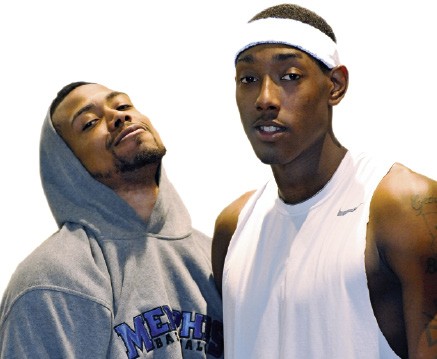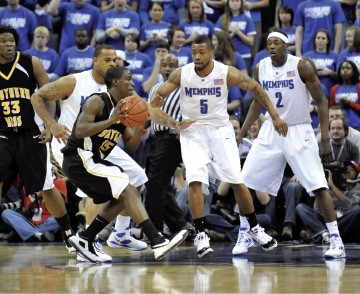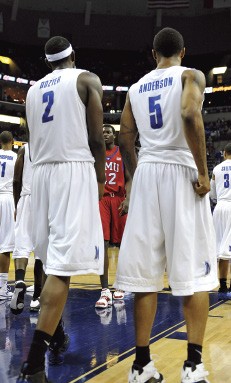Antonio Anderson has a tattoo of an angel on his chest. The angel’s head gazes upward, eyes closed, with a wing stretching across each pectoral. Above the image are the words “Death Before Dishonor.” A bit on the grim side, perhaps, but a message that reflects Anderson’s basketball life rather poetically. As the senior guard nears the end of the most successful four-year career of any Memphis Tiger basketball player — ever — “dishonor” is a word well outside his considerable sphere of influence on the U of M program.
Somehow it’s fitting that when Anderson does leave the Tiger program, he’ll leave it merely tied for the most decorated career in its history. For this “complementary” player, this “glue guy” as even the national media have come to see him, the dozens upon dozens of victories were compiled almost entirely with Robert Dozier at his side. Unlike Anderson, Dozier has a blemish on his four-year life as a Tiger, but it’s one he’s survived and may be as important a lesson as any he’ll learn before picking up his diploma. Labeled “complementary” far too much himself, Dozier joins Anderson as the most distinguished duo the Memphis program has seen since the days of Larry Finch and Ronnie Robinson 36 years ago.
When the Tigers won their 23rd game of the season on February 18th against SMU, it was the 127th notch on the belts of Anderson and Dozier, passing former teammate Joey Dorsey (2004-’08) for the most career wins by any player in the program’s 89-year history. (It should be noted that fellow senior and former walk-on Chance McGrady is the third member of this record-breaking class, all three of whom are on schedulue to graduate in May.) Said Anderson after the game, “It’s a nice record to have, but we also want an NCAA [tournament] record. It’s a lot of wins, but before we’re finished, it’s gonna be an impossible number to reach.”
Should Memphis earn 30 wins for a fourth straight season, Anderson and Dozier will break the current NCAA mark of 133 career wins by the Duke senior class of 2001 (which featured former Memphis Grizzly Shane Battier). With their final postseason still ahead, Anderson and Dozier already have four regular-season Conference USA championships to their credit, along with three C-USA tournament titles, two trips to the NCAA regional finals (Elite Eight), and last year’s march all the way to the national championship game. When they suit up for their first NCAA tournament game this month, it will extend the school record of 14 they currently share. It could be argued these two have earned their own wing of the yet-to-be-built athletic Hall of Fame on the U of M campus. Yet watch how quietly they leave the spotlight.
Anderson was part of the most acclaimed recruiting class in Coach John Calipari’s nine years at the Memphis helm. He arrived in 2005, alongside three teammates from a prep-school juggernaut (Laurinburg in North Carolina) that had gone 40-0 the season before. Those teammates: Shawne Williams (now a member of the NBA’s Dallas Mavericks), Kareem Cooper, and Robert Dozier. While Williams stole the show among that freshman class, Anderson started 21 games for a team that featured All-America-to-be Rodney Carney and Darius Washington. By season’s end, he was guarding the opponent’s top scoring threat one game after another, a role he’s maintained ever since. And he loves the “glue guy” tag.
“That means I mean a lot to my teammates and coaches,” he says. “I want to be remembered as one of the guys who always came and gave it his all, whether I scored 10 points or no points. I just want to be known as a hard worker and a winner.”
Years from now, Anderson may be best remembered for the pair of free throws he made with seconds to play to beat Texas A&M in San Antonio and earn the Tigers a trip to the 2007 Elite Eight. But there were other moments when the glue guy was the difference-maker. Anderson scored a game-high 19 points in the 2008 C-USA championship game at FedExForum, earning unlikely MVP honors in front of a pair of All-America teammates, Chris Douglas-Roberts and Derrick Rose. His buzzer-beating three-pointer — shot from just inside the halfcourt line — before halftime this year in Knoxville proved to be critical in the Tigers’ two-point win over Tennessee. On January 23rd in Tulsa, Anderson took an inbounds pass, drove the length of the court, and converted an off-balance layup to beat the Golden Hurricane at the buzzer, 55-54.
And let’s not forget the Tigers’ first win of 2009, a blowout over Lamar in which Anderson became only the second player in Memphis history to record a triple-double (12 points, 10 rebounds, 13 assists). He has been, beyond question, Calipari’s steadiest hand in uniform over the last four years, with more than twice as many assists (490) as turnovers (225). With 10 more assists, he’ll become the first Tiger in history to rack up 1,000 career points, 500 rebounds, and 500 assists.
However full his stat box may be, though, it’s Anderson’s leadership qualities that rub off most on his teammates. “He’s an emotional leader on the court,” Dozier stresses. “He’ll get in someone’s grill, on and off the court. He won’t settle for less than the best. He gets on people to go to class. He has to … he’s a leader.”
 by Larry Kuzniewski
by Larry Kuzniewski
Antonio Anderson & Robert Dozier
Anderson grew up in Lynn, Massachusetts, and was familiar with the success Calipari enjoyed across the state at UMass. “When he started recruiting me here, I thought it was such a coincidence. I committed without even taking a visit. He knew where I was from. He told me the food’s better, you won’t get any snow. All the other coaches promised me things, but Cal told me nothing would be given to me. He told me I’d have to work to earn my way here. All he promised me was that I’d be a part of the team and on a scholarship.”
While Anderson emphasizes that he has work yet to do as a college basketball player, he looks at his final weeks as a Tiger on a scale beyond many student-athletes. “I’ll be the first in my family to graduate from college,” he notes. “That’s better than a national championship. I never would have thought I’d do this in my entire life.”
The most shocking element of the news in January 2008, that Robert Dozier had been involved in a public altercation, was that it was Robert Dozier. Among the most soft-spoken Memphis players in memory, Dozier was in the third year of a gradual rise toward stardom.
When he struck a former girlfriend after an argument that started in a downtown club, a community accustomed to off-the-court “news” from its basketball team was this time jarred by the newsmaker. (The charges were dropped three months later, amid allegations that the former girlfriend had also threatened Dozier’s current girlfriend.) Dozier made a brief apology to the media after the Tigers’ next game, one he sat out as punishment. The rest of the season — all the way to the Final Four — and throughout the 2008-’09 campaign, he’s again been, well, Robert Dozier. Efficient, steady, and, yes, quiet.
Calipari notes the maturation of young men made stars all too soon as an overlooked variable in a program like his. “At some point, kids get it,” he says. “The difference with my guys is they’re in the spotlight. Things that normal kids grow out of — here, it’s the price they pay for being in a top-five program. Some kids have money in the bank. They screw up, you say, ‘What are you doing?!’ And you deal with it. Others, no money in the bank, and they’re gone. Robert turned things around.”
 by Larry Kuzniewski
by Larry Kuzniewski
“My parents and my teammates stayed with me,” Dozier recalls. “It’s not about what you do; it’s what you learn from what you do. That changed me as a person off the court, being more focused on what matters. Before that incident happened, I might have felt tired of going here or going there. But it helped me realize how lucky I am to be in this position. People come up to me and ask if they can have my autograph. People would kill to be in that position.” (Anderson and Dozier each say they sign more than 100 autographs a week. “You can’t even go into the gas station,” Dozier says with a chuckle.)
With his omnipresent headband, Dozier has earned his minutes largely in and around the paint, earning stripes with every offensive rebound and putback, at times stretching the opposing defense by firing away from beyond the three-point arc (he’s made 47 in his career). It’s harder to find a signature Dozier moment than it is for Anderson, but let’s not forget that an offensive rebound by Dozier preceded Anderson being fouled and winning that tournament game over Texas A&M in 2007. He’s never scored more than 23 points in a game, but Dozier has climbed into the top 30 among career scoring leaders at Memphis and could become only the fifth Tiger to finish his career with 1,000 points and 1,000 rebounds.
If there was a turning point to the 2008-’09 season to date, it was certainly the Tigers’ demolition of Gonzaga in Spokane on February 7th (a game Memphis entered ranked 14th in the country). And one of the most important sequences of that contest came late in the first half when Dozier hit a pair of free throws to give Memphis a 35-20 lead, then drew a charge on the Bulldogs’ next possesion. The rout, as they say, was on.
Like Anderson, Dozier will be the first member of his family to graduate from college. And like Anderson, when asked to reflect on the memories of his Tiger days that stand out, it comes down to lots of wins and friendship. “We’re like brothers from another mother,” he says with a smile. “Everybody’s close; we know what’s going on daily with each other’s families. That’s not going on everywhere, on every team. It’s just being together, being able to read a guy’s mood. You get to talking, and you go from there.”
“Robert and Antonio came in with a class that absolutely changed the history of Memphis basketball,” Calipari says. “They altered the course of where this thing was going. They stayed; the other kids moved on, and that’s okay. Now Robert and Antonio end up winning more games than anyone in the history of the program.”
Anderson and Dozier have been a part of five winning streaks of at least 12 games over their four years in Memphis, including the two longest streaks in Tiger history (25 games as sophomores, then 26 as juniors before their current 20-game streak). For some perspective, over the 85 years the U of M played basketball before this pair’s arrival, there was a total of five such streaks. “I’ve never been the type that pays attention to winning streaks,” says a hard-to-impress Anderson. “If the wins come, they come. You just gotta be humble. You can’t take anybody for granted. You gotta go out, play like it’s a championship game, and come away with a ‘W’.”
Junior point guard Willie Kemp has been a teammate of Anderson’s and Dozier’s (and McGrady’s, he’ll emphasize) for three years. Kemp says he’s gained as much from his friendship with these record-breakers as he has any on-court benefits. “They’re great teammates, all three of them leaders,” he says. “I’ve been in class with all of them. Chance and Antonio are my roommates. After this basketball stuff is over, we’ll still talk.”
“They’ve shown great leadership,” Calipari adds, “Antonio especially in that regard. And Robert’s come around; he’s been more assertive than he’s ever been in his life, which is good to see.”
It’s been 14 years since the U of M last retired a uniform number (that of Forest Arnold, a year after Penny Hardaway’s was retired). U of M athletic director R.C. Johnson and friends will need to find an appropriate way to pay tribute to the most decorated four-year era in Tiger basketball history, so here’s a suggestion for a novel approach. Why not honor Anderson and Dozier together, on the same (perhaps oversized) banner? A pair of talented “complementary” players who together took Tiger basketball to an unseen, extraordinary level.
Leave it to their coach to shape the final distinguishing legacy of this pair, now forever linked in Memphis sports history. Calipari has coached a player chosen second in the NBA draft (Marcus Camby in 1996) and another chosen first (Derrick Rose last year). But Camby and Rose are looking up at Anderson and Dozier when it comes to the number that matters most. “When I told a reporter in New York what their record is [130-13],” Calipari reflects, “he went, ‘What?!’ You can’t even do that on a video game. Antonio and Robert will always stand out.”
 by Larry Kuzniewski
by Larry Kuzniewski